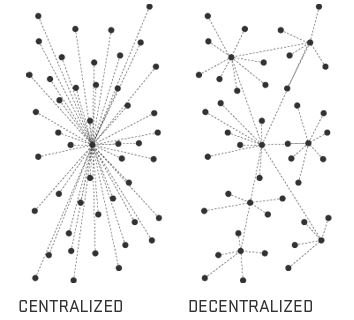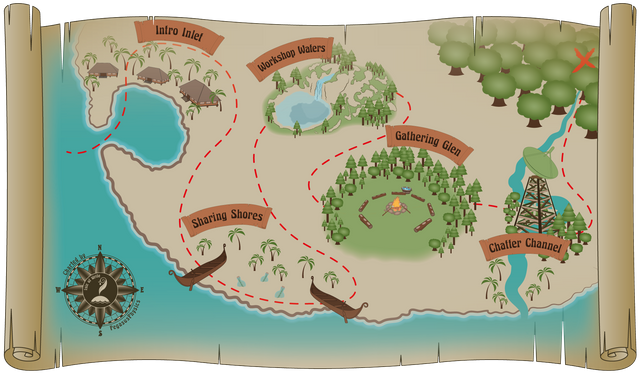Sustainability for Kids: decentralization

Part 1 | Part 2 | Part 3 | Part 4 | Part 5 | Part 6 | Part 7 | Part 8
Part 9 | Part 10 | Part 11 | Part 12 | Part 13 | Part 14 Part 15 | Part 16
Richard Gregg recognized in the 1930s that simplicity and sustainability required a move toward decentralization.
But what exactly does decentralization mean?
Rather than structuring a system to be centralized, where one unit controls the other units, a decentralized system is more of a network where units can self-regulate (self-control) or where smaller groups of units can form patches that self-regulate.

A good example of a centralized system would be a one-world government, where one group of leaders attempts to control the entire world. In contrast, a decentralized system of government would be broken into various governments, large and small, to regulate only their own area. The most decentralized system of all would be anarchy. And anarchy doesn't mean chaos or the lack of a system; it means self-regulation at the smallest level – the individual.
Tad Hogue, a researcher at Xerox PARC, explained decentralization this way, using the body as an example:
“If every human cell's protein production had to be processed through the brain, the costs of coordination would quickly overwhelm the nerve cells' capacities. Consequently, most decisions are made within the cell, or by the internal communications of the endocrinal system, which bypasses most brain functions. Although we tend to think of ourselves being in complete command of our bodies, most of life's choices are made within the individual cells.”
So the biggest reason that a decentralized system would be necessary to achieve sustainability is that centralized systems are more expensive to run. Centralized systems have added “costs of coordination.”
What are some costs of coordination in our world today? One huge cost is the “bureaucratic red tape” we encounter when the federal government attempts to solve a problem. Because the federal government is a good example of a centralized system, we can see many costs of coordination in its processes. For each problem the federal government attempts to solve, it must create an agency staffed with people who are somewhat removed from the problem they're trying to fix. The costs of running these various agencies are huge costs of coordination that could be avoided if the government left most problem-solving to smaller communities.
Computers have helped us to see how decentralized systems are better at solving problems than centralized ones. Researchers at Xerox and the Santa Fe Institute have used computer models to show that central coordination is much less effective. In many cases, centralized systems left to run their programs out indefinitely end up locked or frozen after many iterations.
We'll explore more about what computers can tell us about decentralized systems and sustainability next time.
This article is one of a series I'm writing for the 30 Day Writing Challenge hosted by @dragosroua. If you want to join, write on a topic that interests you or that you'd like to learn more about and use the tag #challenge30days. As Dragos says, "The key word sequence here is: "write every day."

Think you'd like to wash up on our shore?
The treasure map will bring you right to our door!

cover art created with a pixabay.com image ]

Decentralization works well if its not bureaucratic, imagine people or citizens that they wouldnt have gotten if their system of governancee was centralized, they reach to the grassroots. Keep Steemin!
thanks for the update
Your post is very good.This photo is very nice
This article teaches me if decentralization is better than centralization.
Decentralization is separate groups which have freedom to do something, and can collaborate to other groups if there are troubles. Remember this word : "Two heads are better than one." Means if decentralized systems makes any troubles faster to break than centralized systems.
Don't follow what your parents said if it's bad, you need to lie. You better lying if lying can bring peace. Don't be fanatic with bad things brought by old generation, if you want better. The era of modern technologies has been entered, don't follow the old era's bad thoughts.
Technologies bring ourself easier, if it used for good. Leaving technologies bring yourself harder, same as you do suicide slowly. God created humans to be use technologies, this differs humans from animals.
indeed computers makes it easier and better